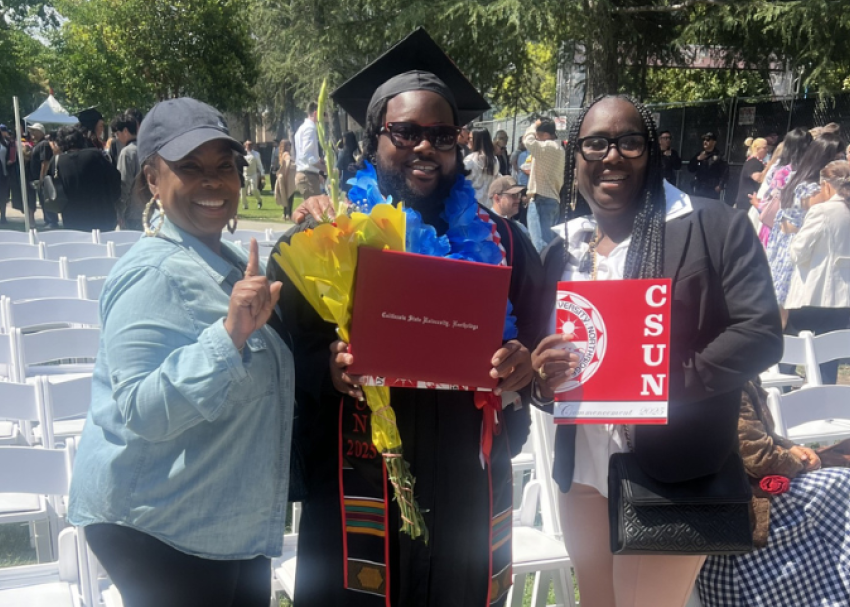Sean Caldwell was getting excellent care in Las Vegas. But by 2022, he knew it was time for more than maintenance—he wanted momentum. He wanted to be closer to family. To show up more fully for his four kids. To finish his degree. To build a career that could change lives.
So he came home.
Returning to Los Angeles meant starting over. As a Black trans man, Sean had already fought to find care that saw him clearly. Now he had to rebuild that trust in a new setting. He hoped the support would be there—but he wasn’t sure.
Fortunately, he found Venice Family Clinic.
A care model built to last
Referred through Medi-Cal, Sean began receiving care from nurse practitioner Lisa Cederblom, clinical site director at the Simms/Mann Health and Wellness Center. From the beginning, the relationship was different.
“She’s on it,” Sean says. “If I message her, she gets back to me. If I need something, she makes sure I have it. And when we talk, it’s not just clinical—it’s real. She cares about how I’m doing.”
Cederblom says that kind of care is intentional. “I always want our trans and nonbinary patients to hear me say, ‘I’m glad you’re here.’ That matters. And it reflects how we think about care across the Clinic: we meet people where they are, and we build forward from there.”
Getting affirming care outside the Clinic isn’t always easy. “The system is fragmented, and patients often face delays and denials,” she says. “We do what we can to close the gap—whether that’s reworking referrals, following up with insurers or helping them navigate pharmacy barriers.”
That kind of coordination is part of what makes the Clinic’s model distinct. When Sean began preparing for gender-affirming surgery, Cederblom referred him to associate director of behavioral health Jen Amaya Gonzalez for the documentation required by his surgical team. What started as a one-time task became something more: another source of care and consistency.
Tools for clarity and control
Sean wasn’t sure what to expect when he first met with Amaya Gonzalez. He’d been referred for a letter—and he didn’t expect much more than completed paperwork.
Then Amaya Gonzalez did something simple but rare: she listened.
“It didn’t feel like she was working her way through a checklist,” Sean says. “It felt like someone trying to truly understand where I was coming from.”
At the time, Sean was holding together more than most could manage. He was working multiple jobs. Taking a full course load. Parenting. Managing major medical milestones. “I wasn’t taking care of myself while I was building my new life,” he says.
He was overwhelmed and running on empty. But Amaya Gonzalez gave him space to pause and build something stronger. Journaling helped him clear his head. Breathing exercises helped him reset. Reflective reading kept him anchored to his long-term goals.
“Sean didn’t need fixing—he needed space to reconnect with what supports him,” Amaya Gonzalez says. “That’s where we focused.”
That kind of care made a lasting impact. “Jen was a huge help,” Sean says. “She gave me the tools to stay steady, even when things got overwhelming.”
Moving forward and giving back
With his care team behind him, Sean moved forward. He earned two associate degrees, transferred to California State University, Northridge, and recently completed his bachelor’s in criminal justice—all while raising his kids and working multiple jobs.
Along the way, he’s broken cycles of instability, incarceration and silence around identity—building something stronger not only for himself, but for his family. And he did it with a care team that treated his goals as real and his identity as whole.
“This kind of affirming care doesn’t happen by accident,” says Cederblom. “It reflects a broader commitment at Venice Family Clinic to meet people where they are, treat identity as integral to health and build relationships that support long-term goals.”
Sean now gives back through one of the clinic’s support groups, offering honesty and encouragement to others navigating similar paths. “Some people just need to hear that they’re not alone,” he says. “That there’s still a way forward.”
“Even when things are difficult, Sean shows up with generosity,” Amaya Gonzalez says. “That makes a difference—for the group, and for the community.”
That same purpose is shaping his next chapter: a career in juvenile justice—where he hopes to offer structure and care to young people before it’s too late. “I want people to know they can be themselves,” Sean says. “You’re human, just like everybody else. That means you deserve support.”
Sean’s story reflects what’s possible when care is built around trust, coordination and respect—and what it means to turn that care into something bigger.
